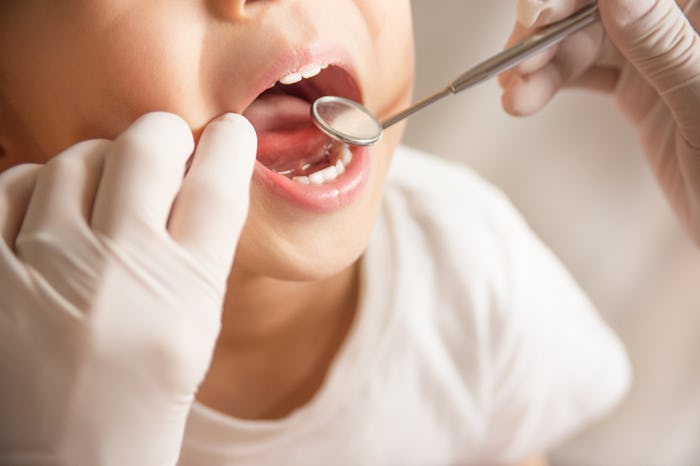Life
Many Parents Aren't Taking Their Kids To The Dentist Soon Enough, Study Finds — Here's Why
There are so many rules for new parents to follow, it's hard to stay on top of every single last one. But a new study from the University of Michigan recently found that parents are missing one very important milestone and that children aren't going to the dentist soon enough as a result
It's not entirely their fault, as the survey of almost 800 parents found that more than half of parents weren't counseled by a doctor or dentist about when to take their baby to get a cleaning and checkup at the dentist. But only 30 percent of parents correctly assumed that their baby should go to the dentist as early as 1 year old.
Instead of having their doctor talk to them about going to the dentist, parents reported that their friends and family were advising them, though obviously those relatives and park buddies didn't know that both the American Dental Association and the American Academy of Pediatric Dentistry both recommend taking a baby to the dentist at the one year mark.
Over half of the parents surveyed waiting until 2 or 3 years old for baby's first dentist appointment, which probably isn't so harmful, but the experts say getting some professional eyes on the teeth and gums to make sure you've been cleaning them correctly and there's no decay is the best bet.
I totally get it — going to the dentist is awful for grownups, and it has to be especially terrible for kids. And then the adult who has to soothe the kid after the trauma of having someone probe around their mouth. There's really nothing pleasant about dentistry. But, as we've all been told, oral health is a clear indicator of our overall health and keeping up on cleanings is the best thing you can do for your kid in the long run.
However, a lot of parents in the study reported that they just assumed their kids' teeth were healthy judging by the looks of them instead of taking them preventative care and teaching them good dental habits going forward. The poll's co-director Sarah Clark said in press release accompanying the study:
Parents may not notice decay until there's discoloration, and by then the problem has likely become significant. Immediate dental treatment at the first sign of decay can prevent more significant dental problems down the road, which is why having regular dentist visits throughout early childhood is so important.
The survey found that when parents are counseled, they take their kids to the dentist, but a lot of families are slipping through the cracks of care. And it's not just a fear of opening wide, dental coverage is hard to come by, even if you're employed. Unfortunately, being able to take care of your oral health is a privilege that low-income families and those on Medicaid just don't have. In the press release, Clark said:
Our poll suggests that families who are low-income, less educated, and on Medicaid are less likely to receive professional guidance on dental care. This is particularly problematic because low-income children have higher rates of early childhood tooth decay and would benefit from early dental care.
She suggested that providers who care for at-risk populations should focus on remembering to counsel new parents about the importance of a dental visit for their newborn, just like they focus on making sure the baby makes its well-visits and gets all of its shots. Clark added that while the onus is definitely on health care providers to guide parents through the process of starting dental care. She said, "parents should also ask their child's doctor or their own dentist about when to start dentist visits and how to keep their child's teeth healthy," just to be safe.
Check out Romper's new video series, Bearing The Motherload, where disagreeing parents from different sides of an issue sit down with a mediator and talk about how to support (and not judge) each other’s parenting perspectives. New episodes air Mondays on Facebook.
